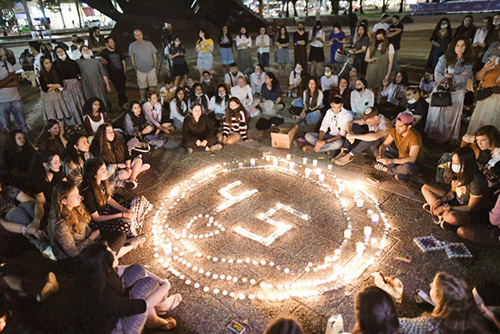
After Lag B’Omer night’s celebration turned tragic, with heavy hearts, the Jewish nation began grieving 45 lives lost at Mount Meron, with a national day of mourning declared on Sunday.
Many communities, populations and subpopulations within Israel were personally affected by events of the night, either directly as they were also at the mountainside celebration, or knew people who were there; or by seeing news reports or harrowing posts on social media as the events unfolded. With 150,000 attendees at Meron at the time of the disaster and about another 300,000 on their way or having already left, many were left with indelible images in their minds of the events as they transpired. Individuals attending the event were also stranded or separated from their groups. In addition to those who died, approximately 150 people were injured. The cell phone system was not working during the highest points of the crisis, rendering many family members and individuals unable to reach each other, causing incredible stress.
Dov Maisel, vice president of United Hatzalah, was one of the first responders at the scene, among 300 from United Hatzalah alone (ZAKA and Magen David Adom also responded in large numbers). Maisel said that in 30 years of working as an EMT, Meron was one of the most difficult incidents to process. He said after treating some of the injured that his own team of volunteers, many of whom have seen the worst in the world from their work on the front lines, “broke down themselves and were assisted by our psychological trauma unit,” he told JNS.
In the immediate aftermath, many Israelis lined up to donate blood, to the point where some had to be turned away. Arab and Druze villages in the north offered refreshments to the masses of people trying to make their way home from Meron, as well as accommodations for those stranded before Shabbat.
“All 45 deaths punctured a hole in the collective heart of the Jewish nation. While we know that the Almighty runs the world and has His reasons, our grief at their loss is the appropriate reaction,” said Rabbi Steven Burg, CEO of Aish Global and a Bergenfield native.
As Donny Morris, z”l, was a 19-year-old shana alef student at Yeshivat Sha’alvim from northern New Jersey, that group was particularly traumatized. Rabbi Burg was at the Kotel as thousands of them converged on Motzei Shabbat to weep together.
To help assist yeshiva and seminary students affected by the accident, the Israeli Diaspora Affairs Ministry began approving measures to loosen its restrictions regarding individual requests for those in Israel to leave the country for short periods to see their family. COVID-19 restrictions so far have not allowed students in Israel to either have visits from their vaccinated families or to leave.
MK Dov Lipman, on his Facebook page, noted, “If you live in Israel holding visa status you can now request permission to leave Israel and to return after a short visit abroad. To do so complete this link and await up to 7 days for approval to be sent to you. After approval one is enabled to leave Israel up to 45 days after receiving it.” Lipman, an American oleh, has been a champion for olim and a passionate advocate to the Diaspora Affairs Ministry.
Rabbi Avi Berman, of OU Israel, told Arutz Sheva that “we’re talking about tremendous cycles of people who were affected” by the tragedy, especially given that many young boys who were sent by their parents to study in Israel do not have their parents to rely on to help get through the trauma. “Even with psychologists and social workers being brought in by the yeshivot and seminaries, mental health professionals cannot be around 24 hours a day, the way parents can, in case a child decides they need to talk about what they experienced.”
Ohel’s Dr. Norman Blumenthal, who specializes in crisis management and intervention, shared that adolescents in particular can be assisted in specific ways. “Adolescents would be most likely to struggle with the appearance of injustice of such suffering. They might pose the unanswerable question of ‘why bad things happen to good people.’ This may emerge all the more so since the victims were participating in a religious and spiritual celebration.
“If such questions are genuinely motivated and worrisome, it is perfectly acceptable to commiserate, discuss and allow them to develop a tolerance for questions and events that are beyond human comprehension. Such heart-wrenching news is also an opportunity to remind our children that it is not always helpful to spend too much time viewing the graphic and relentless photos and information on the internet and social media,” Blumenthal said.
It was announced that the Jewish Agency for Israel will distribute emergency grants to the 45 families who lost their loved ones in the tragedy at Mount Meron. Funds will be allocated to the bereaved families to support their immediate needs during the mourning period. “Unfortunately, the Jewish Agency has decades of experience in working with individuals and families who have suffered trauma, both in Israel and throughout the world,” said Chairman and Executive of The Jewish Agency Isaac Herzog.
“With thanks to our partners from UJA Federation of Greater Toronto and Keren Hayesod, we are mobilizing efforts to help the victims’ families through this unthinkable tragedy. This expression of unwavering support is a true example of how all Jews are responsible for one another,” Herzog said.









